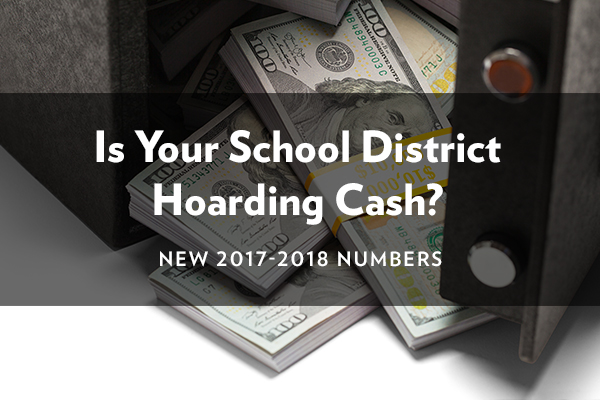Press Release

School Districts’ Cash Stash Tops $4.6 Billion
May 16, 2019, Harrisburg, Pa.—Pennsylvania’s 500 school districts hold $4.6 billion in reserve funds, according the latest data available from the Pa. Department of Education. Reserves rose by $64 million in 2017-18, the 13th consecutive year of growth.
Go to https://www.commonwealthfoundation.org/reserves for a searchable database of all 500 school districts showing reserve fund data. Note: These figures do not include capital reserves normally used for planned construction costs.
“School districts’ reserve funds now equal $38,000 per public school teacher in Pennsylvania,” commented Nathan Benefield, vice president and COO for the Commonwealth Foundation. “While ‘rainy day’ funds are prudent, stockpiling too much of Pennsylvanians’ tax dollars can be irresponsible—especially when a district holds millions in cash while hiking property taxes.”
(Graphic: School District Reserves, 2006-2018)
Pennsylvania’s Act 1 of 2006 technically limits the level at which school districts may raise property taxes based on an inflation index. School districts can raise taxes above this index by either obtaining approval from voters or by applying to the state Department of Education for an exception.
A recent NBC 10 Philadelphia investigative report revealed that requests for exceptions are never denied. “The way the law is written, we can’t,” said a Department of Education official when asked if they ever deny an exception application.
Thirteen districts hold reserves greater than 20 percent of their budget—the level at which the Auditor General says reserve levels should be questioned—while requesting Act 1 exceptions in at least eight of the last 10 years.
(Map: School Districts Exceeding 20 Percent in Reserve Funds)
The growth in school district reserves comes as some argue against comparatively tiny increases in K-12 scholarships for low- and moderate-income students in the state’s Educational Improvement Tax Credit. “To put this in perspective, school district reserve funds alone could fund the current level of scholarships for 42 years,” commented Benefield.
House Bill 800, which passed the House last week, would increase the caps on the EITC program, empowering more parents to choose what education services best fit their child’s unique needs.
“Every year we hear complaints that school districts are underfunded,” continued Benefield. “While that may be true in some cases, in aggregate, districts have been adding to their billions of dollars in reserves every year for more than a decade. Lawmakers must ensure this money is being used wisely.”
Commonwealth Foundation experts are available for comment. Please contact Michael Torres at 850-619-2737 or [email protected] to schedule an interview.
# # #
The Commonwealth Foundation transforms free-market ideas into public policies so all Pennsylvanians can flourish.